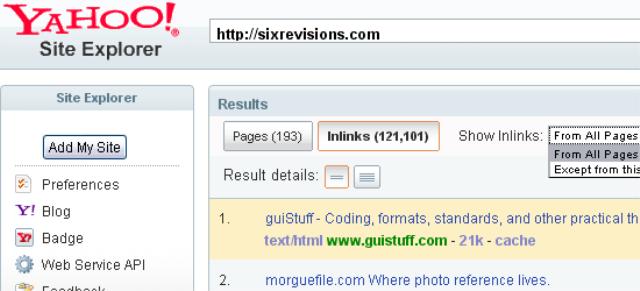
After an amazing six-year run, Yahoo Search retired its popular Site Explorer on November 21, 2011. The service, which allowed webmasters and others to view website information in Yahoos search index, ended as a result of a recent Yahoo/Microsoft alliance.
Summer 2011 kept Yahoo staff busy transitioning the site's organic search results to the Microsoft platform. The Bing Webmaster Tools supported the Site Explorer community throughout the transition. Now that it is complete, the Microsoft webmaster tools are the sole source for both Bing and Yahoo site data and analytics.
The Microsoft Bing team added several new features in 2011, including detailed web traffic statistics and reports, and a promising inbound links feature. New analytics reports, currently under development, will include Yahoo Search usage details.
Although organic search results are powered by Microsoft, Yahoo will continue to offer Internet users an innovative web search experience. Search engine spiders will selectively crawl websites to support Yahoos efforts.
Yahoo Site Explorer

Yahoo launched the Site Explorer on September 29, 2005, with a sleek, easy-to-use interface that webmasters loved. The service gave them a number of handy tools with which to optimize their websites and research the competition.
The free service accepted submissions for sitemaps, feeds, and URLs. This was especially valuable for websites unlikely to be found in the index. To make things easier and more convenient, Site Explorer accepted URL lists so webmasters could avoid one-by-one submissions. They could even submit URL removal requests to Yahoo, for their domain.
A special authentication code enabled webmasters to view extra information about their websites -- the number of backlinks to a particular site or page, for example, and backlinks to their competitors. In fact, Yahoos backlink analysis was the single feature that changed the world for webmasters and online publishers.
Yahoo Site Explorer served as an inspiration to numerous well-known search marketers. It inspired Rand Fishkin, co-founder of SEOmoz, to build the Linkscape index. It amazed Dennis Goedegebuure, an Internet marketing guru, who said backlink research will never be the same. It was the first SEO tool for Gianluca Fiorelli, a web marketing consultant with a fond farewell for the service. And Carla Marshall, an SEO consultant who will also miss Site Explorer, said she grew up with it.
Yahoo paved the way for numerous third party tools, most of which are more advanced and useful than Site Explorer. In the words of its creator, Tim Mayer, I am always very excited when people come up with upgraded features that Site Explorer did not have.
It is important for search engines to focus on the users, but also to interface with webmasters and publishers as well, he continued, noting the vast SEO tools available today. I see a lot of opportunity for these tools to improve and progress in the future, as well.
